Ore
![]()
The title of this article is ambiguous. Further meanings are listed under ERZ.
Ore (plural ores) is a mineral aggregate mined from the earth's crust and usually further processed mechanically and chemically, which was historically mined exclusively for its metal content in order to process it for tools and the like. The Copper Age, the Bronze Age and the Iron Age owe their names indirectly to this raw material.
Ore consists of the ore minerals to be utilized and the non-utilizable gangue. The extraction or mining, above or below ground, and the further usability of the ores, is determined by the geological occurrence of the minerals, their distributive availability and the technological progress of mining, including ore processing, or the subsequent economic operations, such as metal production and processing. Emil Possehl from Lübeck was once the largest ore trader in Europe.
Today, the mining and extraction of many more minerals from the ground into ores is taking place, as the chemical and physical usability is technologically more advanced. In part, economically exploitable minerals that are mined for non-metals such as sulphur, for example, are referred to as ore, but on the other hand they are also referred to as mineral raw materials.
Ores are extracted from orthomagmatic, hydrothermal, sedimentary and weathering ore deposits.
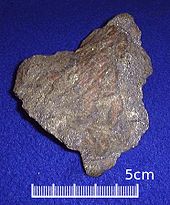
Gold Ore
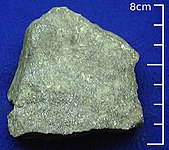
Lead Ore
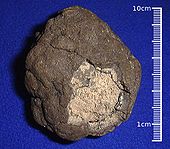
Manganese Ore
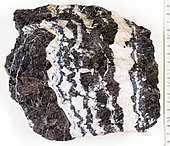
Banderz from Bad Grund with sphalerite (brown) and galenite (dark grey) as ore minerals and calcite (white) as gangue mineral.
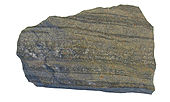
Iron ore (ribbon ore)
Etymology and definitions
The word "ore" (not directly related to the adjective "ehern" in the sense of "iron" derived from Middle High German/ Old High German ër, "ore", via ërin) comes from Old High German aruz(zi), in the sense of "ore" or "metal", and is possibly in origin a borrowing from Sumerian urud(u), "copper".
Ore today is a term used in economics. Whether a mineral deposit is called an ore deposit depends solely on the economics of mining. This includes ores that have been mined throughout history. Since economic viability is the only determining factor, mineral deposits that currently appear uninteresting may well be classified as deposits and mined in times of resource scarcity.
"Ores are naturally occurring mineral aggregates of economic interest from which one or more valuable constituents can be extracted by processing. Most often these are minerals containing more or less metallic constituents."
- Definition according to the UK Institution of Mining and Metallurgy
Nevertheless, in common usage the term is mainly associated with metallic components. The definition according to James F. Kemp 1909 is still valid in principle:
"Ore is a mineral or mineral mixture, more or less intergrown with gangue, containing metal, which, from the point of view of the miner or processor, can be mined at a profit, or profitably processed. The question whether a metal or metals yield a profit seems to be the only possible criterion which can be used."
Compounds such as common salt or lime are therefore not called ores.
The history of mankind has long been associated with the extraction of materials from nature. If at first only the extraction of earths and minerals by more or less accidental collection of freely occurring minerals and weathering products was in the foreground, then soon also a targeted search and mining became the occupation of man.
Ores can have very different metal contents. A tin ore with 2% tin content may already be considered rich, whereas an iron ore is only considered high grade with over 60% iron (formerly in Germany: 30% iron).
Ore, gangue, ore concentrate
In most cases, an ore consists not only of minerals to be exploited, but it also consists of rocks and minerals that are worthless under the specific conditions in each case. That part of an ore which is not economically desirable and which cannot be avoided in mining is called gangue. The valuable ore minerals are separated from the gangue minerals and enriched in the ore concentrate by crushing, grinding, flotation, and other operations collectively known as ore dressing. Gangue minerals, like ore minerals, are constituents of the ore. Gangue is therefore not to be confused with overburden, tailings or other waste rock that must be removed to access the ore. The processing residues, mainly gangue minerals in the form of slurries, are stored in slurry ponds or tailings ponds separated by dams.
Search within the encyclopedia